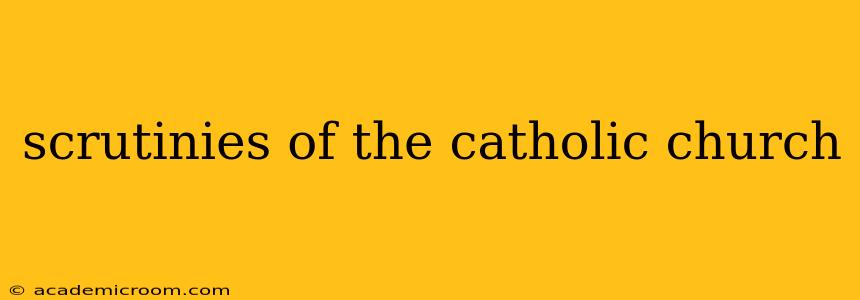The Catholic Church, one of the world's oldest and largest institutions, has throughout its history been subject to various forms of scrutiny. This examination delves into the key areas of criticism, exploring both historical controversies and contemporary challenges. Understanding these scrutinies is crucial for comprehending the Church's evolution, its ongoing struggles, and its continuing influence on global society.
What are the main criticisms of the Catholic Church?
The Catholic Church faces a wide range of criticisms, spanning theological disagreements, historical injustices, and contemporary ethical concerns. Some of the most prominent include:
-
Handling of sexual abuse allegations: This is arguably the most significant and widely publicized criticism facing the Church today. The widespread abuse of children and vulnerable adults by clergy, and the subsequent cover-ups by Church officials, have caused immense suffering and eroded public trust. The ongoing legal battles, investigations, and calls for greater transparency and accountability continue to dominate headlines.
-
Doctrinal rigidity and intolerance: Critics argue that the Church's adherence to traditional doctrines, particularly regarding issues like contraception, abortion, and LGBTQ+ rights, is outdated and intolerant. They contend that these doctrines cause significant harm to individuals and communities, and hinder the Church's ability to engage in meaningful dialogue with modern society.
-
Historical injustices and colonialism: The Church's role in historical events like the Crusades, the Inquisition, and the colonization of the Americas is frequently criticized. Critics argue that the Church actively participated in, or at least condoned, acts of violence, oppression, and exploitation. The lasting impact of these historical injustices continues to fuel contemporary debates about the Church's legacy and its responsibility for addressing past wrongs.
-
Financial practices and wealth: The vast wealth accumulated by the Catholic Church, and its management of that wealth, has been a source of contention. Critics question the Church's tax exemptions, its investment practices, and its transparency in financial matters. Concerns about the distribution of resources and the Church's commitment to alleviating poverty are also frequently raised.
-
Role of women in the Church: The exclusion of women from the priesthood and other leadership positions within the Church is a persistent source of criticism. Many argue that this exclusion is discriminatory and undermines the full participation of women in the life and ministry of the Church.
How has the Catholic Church responded to these criticisms?
The Church's response to these criticisms has varied significantly over time. While some efforts towards reform and accountability have been made, particularly in addressing sexual abuse, critics argue that these efforts have often been insufficient and too slow. The Church has also frequently defended its doctrines and traditions, arguing that they are divinely ordained and essential to its identity.
What are some of the internal debates within the Catholic Church?
Internal debates within the Catholic Church often mirror the external criticisms. These include discussions about:
-
The role of women in the Church: While there is growing support for greater inclusion of women, significant resistance remains among conservative factions.
-
Reform of Church governance: Calls for increased transparency and accountability in Church administration are ongoing.
-
Adapting to modern challenges: There are differing views on how the Church should respond to contemporary social and ethical issues, particularly those relating to sexuality and family life.
Is the Catholic Church reforming?
The Catholic Church is undergoing a period of significant change, though the pace and extent of reform are subject to ongoing debate. While some significant steps have been taken to address specific issues, such as the implementation of stricter policies on child protection, significant challenges remain in terms of institutional reform, doctrinal evolution, and reconciliation with those harmed by the Church. The future trajectory of the Church will depend largely on how it addresses these challenges and engages with the complex social and moral questions of our time.
This overview provides a starting point for understanding the multifaceted scrutiny of the Catholic Church. Further research into specific events, theological debates, and contemporary issues will provide a more complete picture. It's crucial to approach these topics with a critical and informed perspective, acknowledging both the positive contributions and the problematic aspects of the Church’s history and present.
